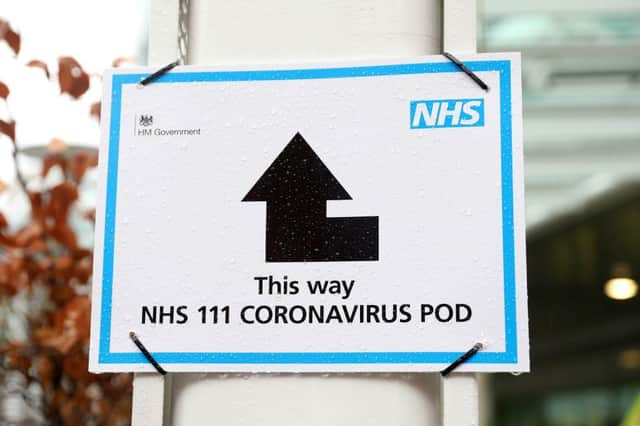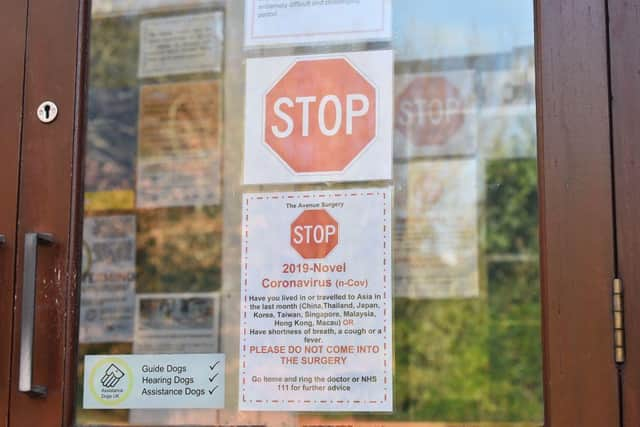Will coronavirus affect repeat prescriptions? How to collect medication during the coronavirus outbreak - and if there will be shortages


With those showing symptoms already going into self-isolation and others being asked to employ social distancing measures, there is a temptation to stockpile in advance.
However, experts have advised against doing so as this could leave vulnerable people empty-handed.
Advertisement
Hide AdAdvertisement
Hide AdThey have assured the public that there will be no shortages so long as everyone acts responsibly.


If you or any of your loved ones require repeat prescriptions from the doctor, here’s what you need to know.
Can I still get repeat prescriptions during the coronavirus outbreak?
A letter from the NHS providing a coronavirus update to staff also stated that “Practices should not change their repeat prescription durations” so for now all repeat prescriptions should be available as usual.
However, the NHS is also currently advising people who may have been exposed to coronavirus to self-isolate, which will require some people to make alternative arrangements for collecting their prescriptions.
If you’re not able to go to the doctor because you’re self-isolating, you could ask a friend or family member to collect your prescriptions on your behalf.
Alternatively, many pharmacists provide a home delivery service, allowing you to sign up and have their medications brought to you directly.
The NHS has also advised that “Practices should consider putting all suitable patients on electronic repeat dispensing as soon as possible.”
Advertisement
Hide AdAdvertisement
Hide AdRather than requiring the prescriber to authorise each prescription by hand, electronic repeat dispensing allows for a batch of repeat prescriptions to be authorised at once.
How are doctor surgeries and pharmacies operating during the crisis?
GPs around the UK are taking steps to limit the number of patients visiting them in person in an attempt to stop the virus spreading further.
Patients are advised to contact their GP either by phone or online, with some practices now refusing walk-ins altogether. They will then be put through additional checks before a face-to-face appointment can be arranged.
Those who suspect they may have contracted the coronavirus should contact NHS 111 for further instructions rather than going to their GP.
Will there be a shortage of medication due to coronavirus?
A Department of Health and Social Care spokesperson said “There are currently no medicine shortages as a result of COVID-19.
“The country is well prepared to deal with any impacts of the coronavirus and we have stockpiles of generic drugs like paracetamol in the event of any supply issues.
“We are working closely with industry, the NHS and others in the supply chain to ensure patients can access the medicines they need and precautions are in place to prevent future shortages.”
Advertisement
Hide AdAdvertisement
Hide AdSandra Gidley, president of the Royal Pharmaceutical Society, has also said that the stockpile of medication which the UK developed in anticipation of Brexit has made them well-equipped to handle the coronavirus.
Gidley said: “The Brexit buffer of medicines that was created in preparation for a no-deal means that the UK is well prepared for any potential medicine shortages and has been able to stockpile to maintain access to medicines.”
Should I stock up on medicine?
Dr. Nancy Messonnier from the Centre for Disease Control and Prevention recommended that those who are at higher risk of becoming seriously ill as a result of the coronavirus should ensure they have a sufficient stock of medication in case they are forced to stay at home.
She recommended those who need medication "have supplies on hand like routine medications for blood pressure and diabetes, and over-the-counter medicines and medical supplies to treat fever and other symptoms."
However, head of policy and development at Community Pharmacy Scotland, Amanda Rae said "Our main message to people is to order what you need, the supply chain is holding up well and there is no need to stockpile.
We obviously understand the anxiety some patients have but, similar to the situation facing the supermarkets, there is enough to go around if people just order what they usually do and are not tempted to order earlier than usual, or get additional quantities."
The Royal Pharmaceutical Society echoed this, urging people not to stockpile as this could “contribute towards potential shortages”.
The official advice for medication at the moment is essentially the same as that for other household supplies – people should ensure they have enough to see them through a potential isolation period but not to stockpile beyond that point.
Coronavirus: the facts
What is coronavirus?
Advertisement
Hide AdAdvertisement
Hide AdCOVID-19 is a respiratory illness that can affect lungs and airways. It is caused by a virus called coronavirus.
What caused coronavirus?
The outbreak started in Wuhan in China in December 2019 and it is thought that the virus, like others of its kind, has come from animals.
How is it spread?
As this is such a new illness, experts still aren’t sure how it is spread. But.similar viruses are spread in cough droplets. Therefore covering your nose and mouth when sneezing and coughing, and disposing of used tissues straight away is advised. Viruses like coronavirus cannot live outside the body for very long.
What are the symptoms?
The NHS states that the symptoms are: a dry cough, high temperature and shortness of breath - but these symptoms do not necessarily mean you have the illness. Look out for flu-like symptoms, such as aches and pains, nasal congestion, runny nose and a sore throat. It’s important to remember that some people may become infected but won’t develop any symptoms or feel unwell.
What precautions can be taken?
Washing your hands with soap and water thoroughly. The NHS also advises to cover your mouth and nose with a tissue or your sleeve (not your hands) when you cough or sneeze; put used tissues in the bin immediately and try to avoid close contact with people who are unwell. Also avoiding touching eyes, nose and mouth unless your hands are clean.
Government advice
As of Monday 16 March the government advised that everyone should be observing social distancing - avoiding unnecessary travel and working from home where possible. Anyone with a cough or cold symptoms now needs to self-isolate with their entire household for 14 days. The government has also advised against going to the pub, out for dinner or partaking in any socialising with large groups. This has caused a number of closures across the country. Schools will close from Friday 20 March for the foreseeable future and exams have been cancelled.
The over 70s or anyone who is vulnerable or living with an underlying illness are being asked to be extra careful and stay at home to self-isolate.
For more information on government advice, please check their website.
Should I avoid public places?
Advertisement
Hide AdAdvertisement
Hide AdThe advice now is to avoid public places and any non-essential travel. Travel abroad is also being advised against for the next 30 days at least, and many European countries have closed their borders.
What should I do if I feel unwell?
Don’t go to your GP but instead call NHS 111 or look online at the coronavirus service that can tell you if you need medical help and what to do next.
When to call NHS 111
NHS 111 should be used if you feel unwell with coronavirus symptoms, have been in a country with a high risk of coronavirus in the last 14 days or if you have been in close contact with someone with the virus.
Sources: World Health Organisation and NHS
